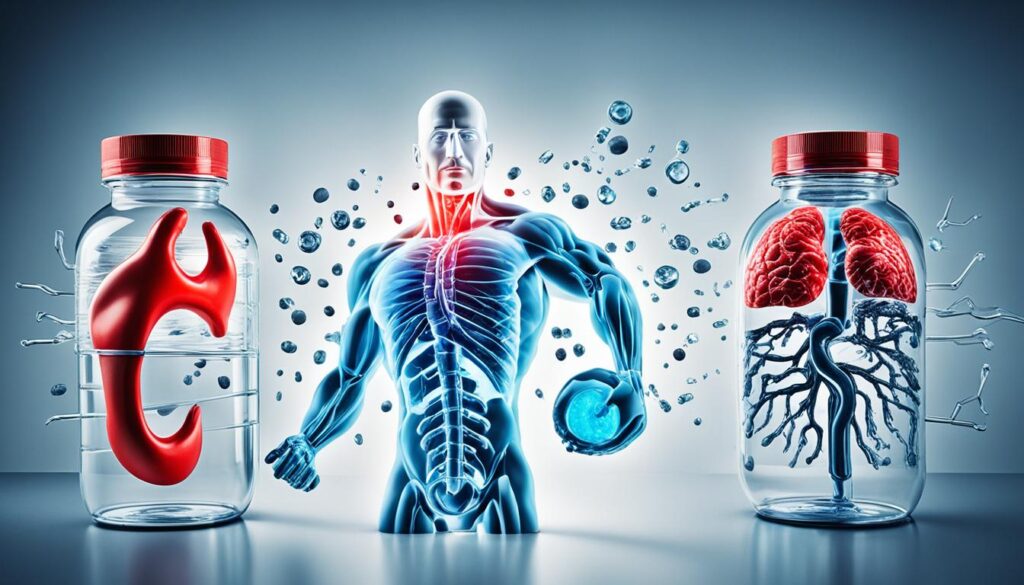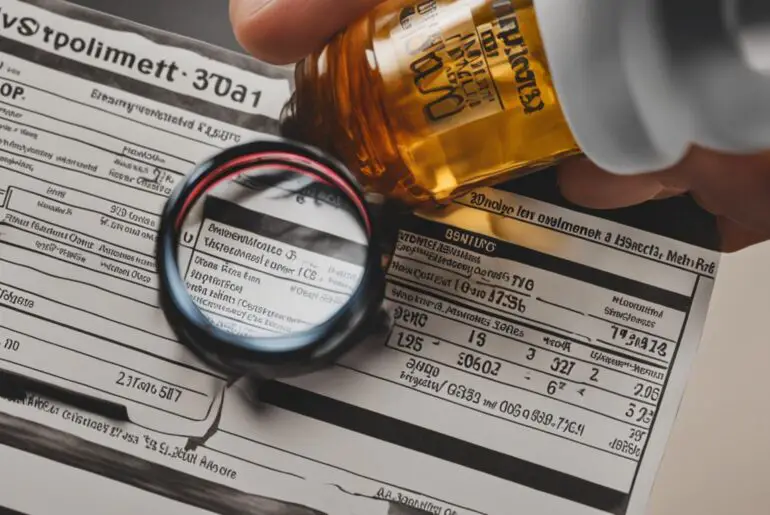Did you know that HCG diet supplements, commonly used for weight loss purposes, are not approved by the FDA and can pose serious health risks? Despite their popularity, these supplements have not been proven effective and may have adverse effects on your overall well-being.
The HCG hormone, also known as human chorionic gonadotropin, is a naturally occurring hormone produced during pregnancy. While HCG is used medically to treat fertility issues, its use for weight loss is not supported by scientific evidence.
Over-the-counter HCG weight-loss products are not only ineffective but also illegal. Sold under the label of “homeopathic” remedies, these supplements are not regulated or proven to be safe. Severe calorie restriction, a common aspect of the HCG diet, can lead to various risks and side effects, including gallstone formation, irregular heartbeat, vitamin and mineral deficiencies, electrolyte imbalance, fatigue, irritability, restlessness, depression, fluid buildup, swelling of breasts in males, and the risk of blood clots forming and blocking blood vessels.
It is essential to prioritize your health and well-being when considering weight loss methods. Safer approaches, such as a balanced diet and regular exercise, are recommended and can provide long-term benefits without the potential dangers associated with HCG diet supplements.
Key Takeaways:
- HCG diet supplements are not approved by the FDA and may pose health risks.
- Severe calorie restriction in the HCG diet can lead to gallstone formation, irregular heartbeat, and nutrient deficiencies.
- Over-the-counter HCG weight-loss products are illegal and labeled as “homeopathic” but are not proven to be safe.
- Safe and effective weight loss methods include a balanced diet and regular exercise.
- Prioritize your overall well-being and consult with a healthcare provider before starting any weight loss program.
The FDA Warnings and Legal Issues with HCG Diet Supplements
The use of HCG diet supplements for weight loss is not recommended or approved by the FDA. Over-the-counter HCG weight-loss products are illegal and labeled as “homeopathic”, despite their lack of safety. The FDA has issued explicit warnings against these products, emphasizing their potential health risks. The legality of HCG weight-loss products is a significant concern, as they are not approved for over-the-counter use or for weight loss purposes. HCG medications are required to carry a label from the FDA, explicitly stating that they are not effective for weight loss.
The FDA warns that companies selling over-the-counter HCG weight-loss products are breaking the law and potentially endangering consumer health. These products have not been proven to increase weight loss beyond that resulting from severe calorie restriction, and they do not have any effect on fat distribution or hunger associated with calorie-restricted diets. Therefore, there is no scientific basis to support the use of HCG diet supplements for weight loss.
In order to ensure your health and safety, it is crucial to be aware of the FDA’s warnings and regulations regarding HCG diet supplements. Instead of relying on unapproved and potentially dangerous products, it is best to consult with a healthcare provider to discuss safer methods for weight loss, which may include a balanced diet and regular exercise.
| FDA Warnings on HCG Diet Supplements | Legality of HCG Weight-Loss Products | FDA-Approved Uses of HCG | FDA Label on HCG Medications | Illegal HCG Weight-Loss Products |
|---|---|---|---|---|
| Over-the-counter HCG weight-loss products are illegal and labeled as “homeopathic”. | HCG weight-loss products are not approved for over-the-counter use or for weight loss purposes. | HCG medications are used for fertility issues and are not intended for weight loss. | FDA label on HCG medications clearly states that they are not effective for weight loss. | Companies selling over-the-counter HCG weight-loss products are breaking the law. |
It is important to prioritize your health and safety by following the guidelines and regulations set forth by the FDA. By avoiding illegal HCG weight-loss products and seeking professional guidance, you can make informed decisions about your weight loss journey.
Potential Health Risks and Side Effects of HCG Diet Supplements

The HCG diet, characterized by severe calorie restriction, poses various health risks and potential side effects. Consuming only 500 to 800 calories per day can have detrimental effects on the body, leading to the following concerns:
- Gallstone formation
- Irregular heartbeat
- Vitamin and mineral deficiencies
- Electrolyte imbalance
- Fatigue
- Irritability
- Restlessness
- Depression
- Fluid buildup (edema)
- Swelling of the breasts in boys and men (gynecomastia)
- Risk of blood clots forming and blocking blood vessels (thromboembolism)
The severe calorie restriction practiced in the HCG diet can lead to nutrient deficiencies, which may negatively impact overall health. The unsustainable nature of this low-calorie approach makes it challenging to maintain in the long term.
Instead, individuals should prioritize safe and healthy methods of weight loss, focusing on balanced nutrition and regular physical activity. Consulting with a healthcare provider can help develop an individualized plan that ensures both weight loss and overall well-being.
Side Effects of HCG Diet Supplements
Those who adhere to the HCG diet have reported several side effects, including:
- Fatigue
- Irritability
- Restlessness
- Depression
- Fluid buildup (edema)
- Gynecomastia (swelling of the breasts in boys and men)
“The HCG diet can have a significant impact on a person’s mood and overall well-being. The severe calorie restriction can lead to fatigue, irritability, and depression, making it challenging to maintain the diet in the long term.”
To prioritize one’s health, it is crucial to evaluate alternative weight loss methods that are sustainable and promote overall wellness.
| Health Risks | Side Effects |
|---|---|
| Gallstone formation | Increased risk due to extreme calorie restriction |
| Irregular heartbeat | Caused by electrolyte imbalance from limited nutrition |
| Vitamin and mineral deficiencies | Insufficient intake due to severe calorie restriction |
| Electrolyte imbalance | Resulting from limited nutrition and lack of balance |
| Fatigue | Energy depletion due to severe calorie restriction |
| Irritability | Emotional effects of extreme calorie restriction |
| Restlessness | Difficulty relaxing due to nutrient deficiencies |
| Depression | Negative impact on mood from severe calorie restriction |
| Fluid buildup (edema) | Retention of fluids due to nutrition imbalance |
| Swelling of the breasts in boys and men (gynecomastia) | Hormonal changes from extreme calorie restriction |
| Risk of blood clots forming and blocking blood vessels (thromboembolism) | Increased blood clot risk from imbalanced nutrition |
It is essential to prioritize safe and sustainable weight loss methods that support overall health and well-being. Seeking guidance from a healthcare professional can ensure an individualized approach to weight loss that minimizes risks and maximizes long-term success.
Lack of Evidence for the Efficacy of HCG Diet Supplements
There is insufficient evidence to support the efficacy of HCG diet supplements. While severe calorie restriction may lead to initial weight loss, sustainability is a concern.
Research suggests that HCG weight-loss products may pose a potential risk of increasing the risk of certain types of cancers. HCG can stimulate the production of androgen cells, which may contribute to the growth of cancer cells in certain individuals. It is important to note that more research is needed to fully understand this potential link.
“The use of HCG diet supplements for weight loss is not supported by scientific evidence.” – National Institutes of Health
Furthermore, weight-loss diets that heavily rely on severe calorie restriction, such as the HCG diet, are often unsustainable. Many individuals who follow these diets experience weight regain over time. Sustainable weight loss and long-term success are more likely to be achieved through gradual and permanent lifestyle changes, including a balanced diet and regular exercise.
Health Risks Associated with HCG Diet Supplements
The lack of evidence for the effectiveness of HCG diet supplements is a significant concern, especially considering the potential health risks associated with such supplements. Severe calorie restriction can lead to nutrient deficiencies, electrolyte imbalance, fatigue, irritability, and other adverse effects on overall health and well-being.
It is strongly advised to consult with a healthcare professional before starting any weight-loss regimen, including the use of HCG diet supplements. A healthcare provider can provide personalized guidance and help individuals make informed decisions about their weight-loss goals.
Evaluating Weight Loss Options
When considering weight loss options, it is crucial to prioritize evidence-based methods that focus on long-term health and well-being. Sustainable weight loss can be achieved through a combination of a balanced diet, regular exercise, and adopting healthy habits. Working with a healthcare provider or registered dietitian can help ensure a safe and effective weight-loss journey.
- Gradual weight loss: Aim for a gradual weight loss of 1-2 pounds per week to promote a healthy and sustainable lifestyle.
- Healthy dietary choices: Emphasize a balanced diet that includes plenty of fruits, vegetables, lean proteins, and whole grains.
- Regular physical activity: Engage in regular exercise, aiming for at least 150 minutes of moderate-intensity activity per week.
- Mindful eating: Focus on listening to your body’s hunger and fullness cues, and practicing mindful eating to develop a healthier relationship with food.
By adopting these strategies, individuals can achieve weight loss in a safe and sustainable manner, while also improving overall health and well-being.
FDA Recommendations for Safe Weight Loss

The FDA strongly advises individuals to consult with a healthcare provider when considering weight loss methods. It is important to prioritize safer approaches that promote long-term success and overall well-being.
1. Balanced Diet: Adopting a balanced diet is crucial for safe and sustainable weight loss. This involves consuming a variety of nutrient-dense foods from different food groups to ensure adequate nutrition and energy.
2. Regular Exercise: Incorporating regular physical activity into your daily routine is essential for achieving and maintaining a healthy weight. Engaging in activities such as cardio exercises, strength training, and flexibility exercises can help increase calorie burn, improve metabolism, and enhance overall fitness.
3. Healthy Lifestyle Changes: Focus on making healthy and sustainable lifestyle changes that promote permanent weight loss. This includes developing mindful eating habits, managing portion sizes, practicing stress management techniques, and staying hydrated.
4. Personalized Guidance: Consulting with a healthcare provider can provide personalized guidance and support in developing a safe and effective weight loss plan. They can help assess your specific needs, monitor your progress, and ensure that any potential underlying health conditions are addressed.
“It’s crucial to remember that weight loss is not just about a number on the scale, but rather about promoting overall health and well-being.”
By following the FDA’s recommendations for safe weight loss, individuals can prioritize their long-term health and achieve sustainable weight loss goals.
The Dangers of Very Low-Calorie Diets
Very low-calorie diets, such as the HCG diet, can have serious health risks. These diets involve restricting calorie intake to extremely low levels, typically ranging from 500 to 800 calories per day. While they may promise quick weight loss, they can lead to various complications and nutrient deficiencies.
One of the potential dangers of very low-calorie diets is the formation of gallstones. When the body is not receiving enough calories, the liver releases more cholesterol into the bile, which can increase the risk of gallstone formation.
Another risk is an electrolyte imbalance, which can disrupt the normal functioning of the body. Severe calorie restriction can cause imbalances in important electrolytes like potassium, sodium, and magnesium, which are necessary for maintaining proper heart and muscle function.
Irregular heartbeat is also a concern with very low-calorie diets. The heart relies on a steady supply of fuel to maintain a regular rhythm, and a significant decrease in calorie intake can disrupt this balance, leading to irregular heartbeats or arrhythmias.
Nutrient deficiencies are common in extreme calorie restriction diets. These diets often lack sufficient vitamins, minerals, and other essential nutrients. This can compromise the immune system, impair organ function, and lead to a range of health issues.
The bottom line: Very low-calorie diets carry significant health risks. While they may result in short-term weight loss, they can lead to complications such as gallstone formation, electrolyte imbalance, irregular heartbeat, and nutrient deficiencies. It is crucial to consult with a healthcare professional before embarking on any diet or weight loss plan, as they can provide personalized guidance and ensure it is safe and appropriate for individual needs.
Health Risks of Very Low-Calorie Diets
| Risk | Description |
|---|---|
| Gallstone Formation | Severe calorie restriction can increase the risk of gallstone formation. |
| Electrolyte Imbalance | Very low-calorie diets can disrupt the balance of important electrolytes, leading to complications. |
| Irregular Heartbeat | A significant decrease in calorie intake can cause irregular heartbeats or arrhythmias. |
| Nutrient Deficiencies | Extreme calorie restriction diets often lack essential vitamins, minerals, and nutrients, leading to deficiencies. |
Side Effects Reported with the HCG Diet

Individuals who have followed the HCG diet have reported various side effects that may be attributed to the severe calorie restriction and potential hormonal changes caused by the diet. These reported side effects include:
- Fatigue: Many individuals have experienced feelings of tiredness and low energy levels.
- Irritability: Some individuals have reported increased irritability and mood swings.
- Restlessness: Restlessness and difficulty sleeping have been reported by some individuals.
- Depression: Feelings of depression and sadness have been reported as a side effect of the HCG diet.
- Fluid buildup (edema): Some individuals have experienced fluid retention, leading to swelling and bloating.
- Gynecomastia: Swelling of the breasts in boys and men has been reported by some users.
These side effects highlight the potential risks and negative impacts associated with the HCG diet. It is vital to consider alternative and safer methods for weight loss that prioritize overall well-being and sustainable lifestyle changes.
Potential Long-Term Effects of HCG Diet Supplements

The long-term effects of HCG diet supplements are not well-studied. However, the risks associated with severe calorie restriction, such as gallstone formation, irregular heartbeat, and nutrient deficiencies, are concerning. Prolonged adherence to a very low-calorie diet can have detrimental effects on overall health and well-being. It is important to prioritize sustainable and healthy weight loss methods that address long-term success and overall wellness.
Severe calorie restriction, a common aspect of the HCG diet, can lead to the formation of gallstones. Gallstones are solid particles that develop in the gallbladder, a small organ responsible for storing bile. When the body is deprived of sufficient calories and fat, the gallbladder does not contract as frequently, increasing the risk of gallstone formation.
Another potential long-term effect of HCG diet supplements is an irregular heartbeat, also known as arrhythmia. Severe calorie restriction can disrupt the balance of electrolytes in the body, leading to heart rhythm abnormalities. Electrolytes, such as potassium, magnesium, and sodium, play a crucial role in maintaining a regular heartbeat. When these electrolytes are imbalanced, it can result in an irregular or rapid heartbeat.
The nutrient deficiencies associated with the HCG diet can also have long-term consequences. Severe calorie restriction often leads to inadequate intake of essential vitamins and minerals, such as vitamins A, D, E, K, and B12, as well as calcium, iron, and zinc. These nutrient deficiencies can compromise immune function, bone health, cognitive function, and overall well-being.
It is important to note that long-term adherence to a very low-calorie diet may also result in electrolyte imbalances. Electrolytes are essential for maintaining proper hydration, nerve function, and muscle contraction. When electrolyte levels are disrupted, it can lead to symptoms such as fatigue, muscle weakness, and even more severe complications in extreme cases.
It is crucial to consider the potential long-term effects of HCG diet supplements and weigh them against the perceived benefits of rapid weight loss. Prioritizing sustainable and healthy weight loss methods, such as a balanced diet and regular exercise, is key to achieving and maintaining long-term success. Consulting with a healthcare provider can provide personalized guidance and support in developing a safe and effective weight loss plan.
Lack of Safety and Regulation of HCG Diet Supplements
The use of HCG diet supplements for weight loss is not approved by the FDA and is considered unsafe. In addition, the marketing and sale of over-the-counter HCG weight-loss products are illegal. These products may be labeled as “homeopathic,” but they are not regulated or proven to be safe and effective.
It is important to be cautious of the claims made by manufacturers and prioritize evidence-based and regulated approaches to weight loss. This ensures that the products used are safe and have undergone rigorous testing to validate their effectiveness.
Unlike prescription medications, HCG diet supplements lack the necessary safety measures and quality control required by regulatory authorities. The lack of regulation exposes consumers to potential health risks and dangers associated with these unapproved products.
When considering weight loss options, it is crucial to consult with a healthcare professional who can provide guidance on safe and effective methods. They can help create a personalized weight loss plan that incorporates a balanced diet, regular exercise, and sustainable lifestyle changes for long-term success.
“It is essential to prioritize evidence-based and regulated approaches to weight loss.”
Considerations for Choosing Safer Weight Loss Methods

When it comes to weight loss, it is essential to prioritize your health and safety. Choosing safer methods that promote long-term success should be a top priority. Here are some key considerations to keep in mind:
- Consult with a healthcare provider: Before starting any weight loss journey, it is crucial to consult with a healthcare provider. They can provide personalized guidance based on your individual needs and goals.
- Adopt a balanced diet: A balanced diet that provides adequate nutrition is essential for your overall well-being. Focus on consuming a variety of fruits, vegetables, lean proteins, whole grains, and healthy fats. Avoid extreme calorie restriction or fad diets that promise quick results but may lack essential nutrients.
- Engage in regular physical activity: Regular exercise is key to achieving and maintaining a healthy weight. Find activities that you enjoy and aim for at least 150 minutes of moderate-intensity aerobic activity each week. Additionally, incorporate strength training exercises to build muscle and boost your metabolism.
- Make sustainable lifestyle changes: Weight loss should not be a temporary fix but a lifelong commitment. Focus on making sustainable lifestyle changes that you can maintain in the long term. This includes establishing healthy eating habits, finding enjoyable physical activities, managing stress, and getting adequate sleep.
Remember, weight loss is a journey that requires patience and dedication. By choosing safer weight loss methods, consulting a healthcare provider, adopting a balanced diet, engaging in regular exercise, and making sustainable lifestyle changes, you can achieve lasting results while prioritizing your health and well-being.
Quote:
“The key to successful weight loss lies in making healthy choices that are sustainable in the long term.”
Conclusion
The use of HCG diet supplements for weight loss is not recommended or approved by the FDA. These supplements have been associated with various potential risks and side effects, including gallstone formation, electrolyte imbalance, irregular heartbeat, and nutrient deficiencies. Severe calorie restriction, which is a common aspect of the HCG diet, can have adverse effects on overall health and well-being.
It is important to prioritize safer methods for weight loss, such as adopting a balanced diet and engaging in regular exercise. These lifestyle changes should be explored under the guidance of a healthcare provider who can provide personalized guidance based on individual needs and goals. It is crucial to focus on long-term, sustainable weight loss strategies that promote overall health and well-being.
Instead of relying on HCG diet supplements, individuals should consider alternative approaches that have been proven to be safe and effective. A healthcare provider can offer valuable support and guidance in developing a weight loss plan that aligns with individual needs and goals. With a balanced diet, regular exercise, and a commitment to long-term lifestyle changes, it is possible to achieve and maintain a healthy weight in a safe and sustainable manner.
FAQ
Are HCG diet supplements safe for weight loss?
No, the use of HCG diet supplements for weight loss is not recommended or approved by the FDA. HCG is a hormone produced during pregnancy and is not proven to be effective for weight loss.
Are HCG diet supplements legal?
No, over-the-counter HCG weight-loss products are illegal and labeled as “homeopathic” but are still not safe.
What are the potential side effects of HCG diet supplements?
Potential side effects include gallstone formation, irregular heartbeat, vitamin and mineral deficiencies, electrolyte imbalance, fatigue, irritability, restlessness, depression, fluid buildup, swelling of breasts in males, and the risk of blood clots forming and blocking blood vessels.
Is there evidence to support the efficacy of HCG diet supplements?
No, there is insufficient evidence to support the efficacy of HCG diet supplements for weight loss. Severe calorie restriction may lead to initial weight loss, but sustainability is a concern.
What recommendations does the FDA provide for safe weight loss?
The FDA recommends safer methods for weight loss, including a balanced diet and regular exercise.
What are the dangers of very low-calorie diets like the HCG diet?
Very low-calorie diets can lead to complications such as gallstone formation, electrolyte imbalance, irregular heartbeat, and nutrient deficiencies.
What side effects are commonly reported with the HCG diet?
Reported side effects include fatigue, irritability, restlessness, depression, fluid buildup, and swelling of the breasts in boys and men.
What are the potential long-term effects of HCG diet supplements?
The long-term effects of HCG diet supplements are not well-studied, but risks of severe calorie restriction include gallstone formation, irregular heartbeat, and nutrient deficiencies.
Are HCG diet supplements safe and regulated?
No, HCG diet supplements are not approved by the FDA for weight loss and are considered unsafe. The marketing and sale of over-the-counter HCG weight-loss products is illegal.
What should I consider when choosing safer weight loss methods?
It is important to consult with a healthcare provider and prioritize safer methods such as a balanced diet, regular exercise, and sustainable lifestyle changes.




